TERT promotes epithelial proliferation through transcriptional control of a Myc- and Wnt-related developmental program
- PMID: 18208333
- PMCID: PMC2211538
- DOI: 10.1371/journal.pgen.0040010
TERT promotes epithelial proliferation through transcriptional control of a Myc- and Wnt-related developmental program
Abstract
Telomerase serves a critical role in stem cell function and tissue homeostasis. This role depends on its ability to synthesize telomere repeats in a manner dependent on the reverse transcriptase (RT) function of its protein component telomerase RT (TERT), as well as on a novel pathway whose mechanism is poorly understood. Here, we use a TERT mutant lacking RT function (TERT(ci)) to study the mechanism of TERT action in mammalian skin, an ideal tissue for studying progenitor cell biology. We show that TERT(ci) retains the full activities of wild-type TERT in enhancing keratinocyte proliferation in skin and in activating resting hair follicle stem cells, which triggers initiation of a new hair follicle growth phase and promotes hair synthesis. To understand the nature of this RT-independent function for TERT, we studied the genome-wide transcriptional response to acute changes in TERT levels in mouse skin. We find that TERT facilitates activation of progenitor cells in the skin and hair follicle by triggering a rapid change in gene expression that significantly overlaps the program controlling natural hair follicle cycling in wild-type mice. Statistical comparisons to other microarray gene sets using pattern-matching algorithms revealed that the TERT transcriptional response strongly resembles those mediated by Myc and Wnt, two proteins intimately associated with stem cell function and cancer. These data show that TERT controls tissue progenitor cells via transcriptional regulation of a developmental program converging on the Myc and Wnt pathways.
Conflict of interest statement
Competing interests. The authors have declared that no competing interests exist.
Figures
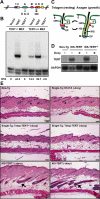
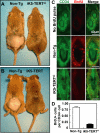

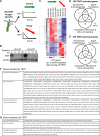
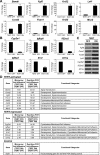
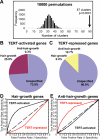
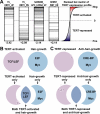
References
-
- Lee HW, Blasco MA, Gottlieb GJ, Horner JW, Jr, Greider CW, et al. Essential role of mouse telomerase in highly proliferative organs. Nature. 1998;392:569–574. - PubMed
-
- Allsopp RC, Morin GB, DePinho R, Harley CB, Weissman IL. Telomerase is required to slow telomere shortening and extend replicative lifespan of HSCs during serial transplantation. Blood. 2003;102:517–520. - PubMed
-
- Flores I, Cayuela ML, Blasco MA. Effects of telomerase and telomere length on epidermal stem cell behavior. Science. 2005;309:1253–1256. - PubMed
-
- Smogorzewska A, De Lange T. Regulation of telomerase by telomeric proteins. Annu Rev Biochem. 2004;73:177–208. - PubMed
Publication types
MeSH terms
Substances
Associated data
- Actions
Grants and funding
LinkOut - more resources
Full Text Sources
Other Literature Sources
Molecular Biology Databases

